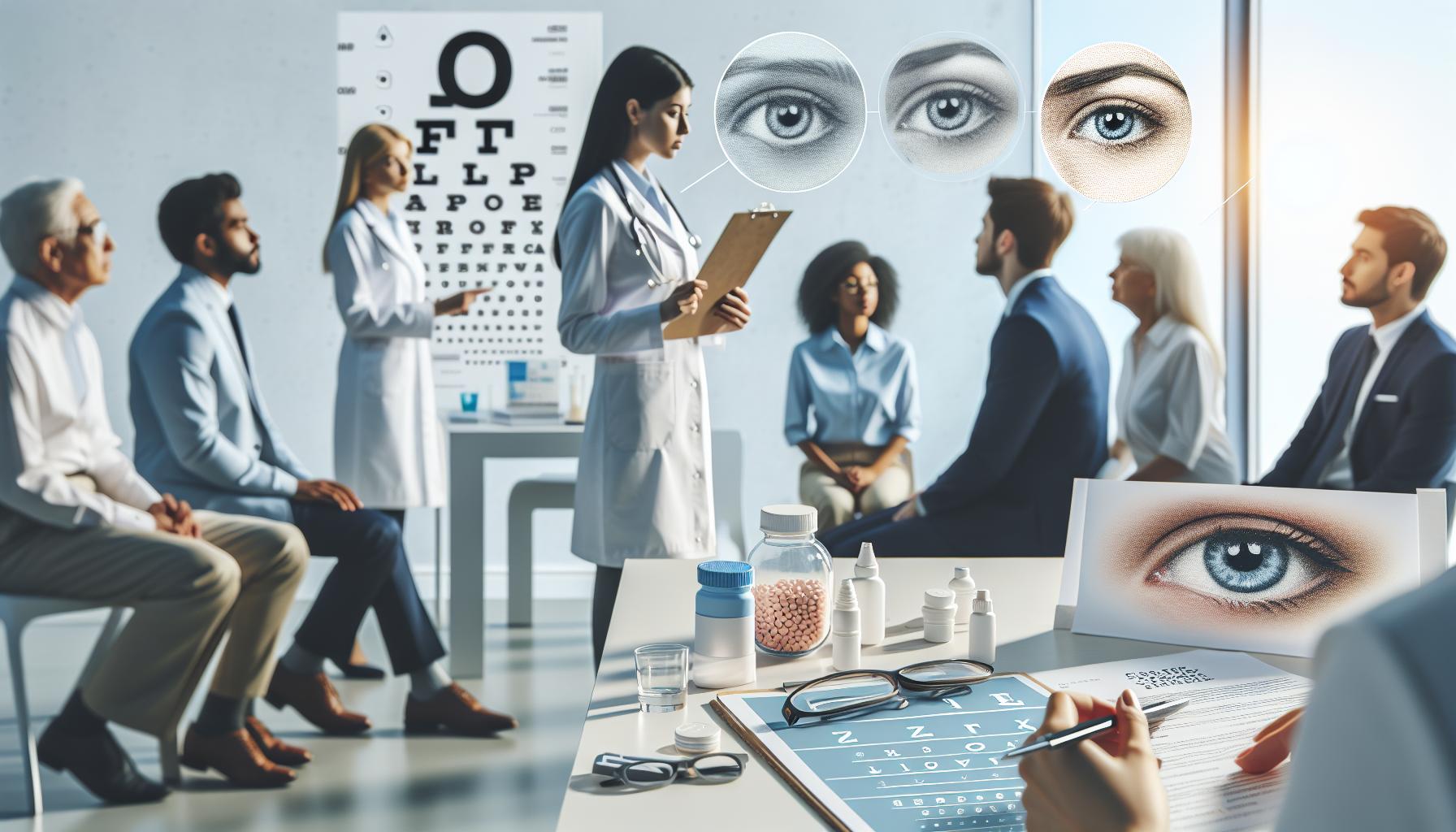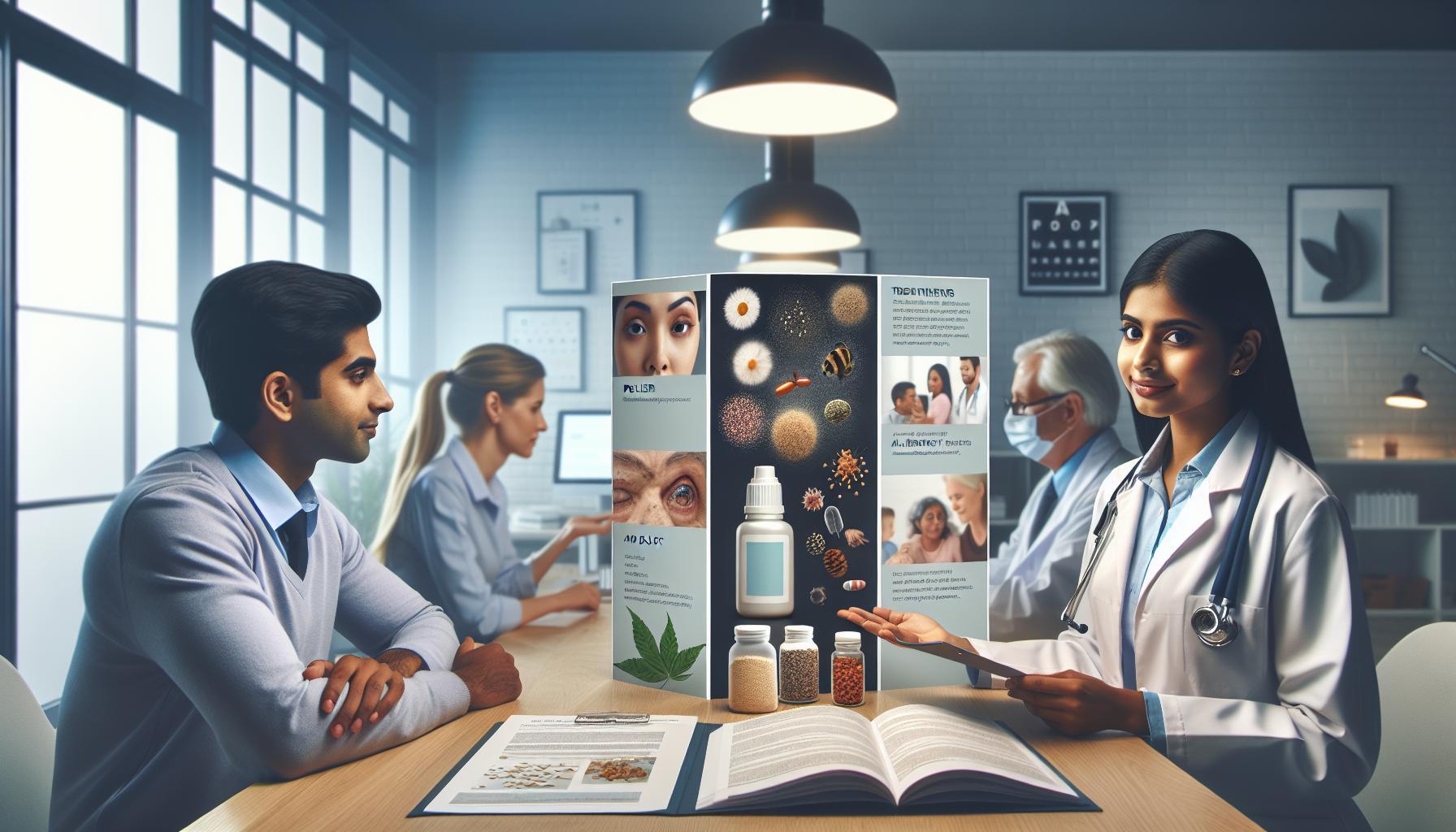Many people experience the frustrating effects of allergies, from itchy eyes to persistent sneezing. But did you know that allergies could also contribute to eye floaters? These little specks and strands that drift across your vision can be concerning, especially if you’re not sure why they’re appearing. Understanding the potential connection between allergies and floaters is essential for managing your symptoms and maintaining eye health.
If you’ve ever wondered whether your allergy flare-ups could be related to changes in your vision, you’re not alone. This topic is crucial for anyone looking to alleviate their discomfort and gain insights into what’s happening with their eyes. Stay with us as we unravel how allergic reactions might influence those pesky floaters and what steps you can take to find relief.
Understanding Allergies and Their Effects on Eye Health
Allergies can have a significant impact on eye health, often leading to a range of uncomfortable symptoms that may affect daily activities. When allergens such as pollen, dust, or pet dander enter the body, they can trigger an immune response that results in inflammation. This reaction can manifest in various ways, including redness, itching, and swelling of the eyes. For many, allergic reactions are not only limited to nasal congestion or skin irritations but extend to the eyes, leading to conditions like allergic conjunctivitis. Understanding this connection can empower individuals to better manage their symptoms and seek appropriate treatment when necessary.
Environmental allergens can contribute to eye floaters, which are tiny specks or spots that drift through your field of vision. When your body encounters an allergen, it releases histamines, resulting in increased blood flow and the potential for swelling in various tissues, including those around the eyes. This inflammatory response can lead to changes in the vitreous gel in the eye, possibly causing or exacerbating floaters. While floaters are often benign, they can be distressing, particularly if they interfere with vision. Individuals experiencing an increase in floaters alongside allergy symptoms should be aware of their condition and consider discussing it with an eye care professional.
To support eye health in the context of allergies, effective management strategies are essential. This can include:
- Identifying Triggers: Keeping a diary of symptoms and potential allergens can help identify the specific irritants causing issues.
- Allergy Treatments: Over-the-counter antihistamines and eye drops designed for allergy relief can alleviate discomfort.
- Environmental Control: Minimizing exposure to known allergens, such as using air purifiers, regularly cleaning living spaces, and avoiding outdoor activities during high pollen counts can be beneficial.
Incorporating these strategies can greatly improve quality of life for those affected by allergies and related eye issues. Regular check-ups with an eye care provider are also crucial, ensuring any changes in vision are monitored and addressed promptly. With appropriate care and preventive measures, individuals can significantly reduce the effects of allergies on their eye health and overall well-being.
What Are Eye Floaters and How Do They Occur?

Eye floaters are a common visual phenomenon that many people experience at some point in their lives. These are tiny specks, spots, or strands that drift through your field of vision, created by tiny bits of gel or tissue in the vitreous gel of the eye. As the eye ages or when the vitreous begins to shrink, these floaters can become more noticeable, though they are often benign and not a cause for concern. However, for individuals with allergies, the inflammation and irritation caused by allergens can exacerbate the perception of floaters or cause new ones to appear.
When allergens like pollen or dust enter the body, they can trigger the release of histamines and other inflammatory mediators. This reaction can lead to swelling and increased blood flow around the eyes. In some cases, this inflammation can affect the vitreous gel’s consistency and clarity, creating an environment where floaters are more easily perceived. People who suffer from allergic conjunctivitis, for example, may notice a spike in floaters during allergy season or after exposure to specific allergens.
To manage the annoyance of floaters, individuals should consider several strategies. First, it’s important to recognize and manage allergy symptoms effectively. Routine use of antihistamines or prescribed medications can reduce inflammation and ultimately lessen the impact of floaters. Keeping a symptom diary can help pinpoint specific triggers, aiding in the control of allergic responses. Additionally, maintaining a clean living environment, using air purifiers, and avoiding exposure to allergens can also minimize the likelihood of floaters becoming disruptive.
If you notice a sudden increase in floaters or experience flashes of light, it’s crucial to consult an eye care professional, as these could be signs of a more serious condition. Regular eye exams can ensure that any changes in vision are noted and addressed promptly, helping individuals maintain optimal eye health even amidst the challenges posed by allergies. Through effective management and awareness, individuals can find relief and regain confidence in their vision.
The Link Between Environmental Allergies and Eye Floaters

Allergies can significantly impact various aspects of health, and this includes eye health. When environmental allergens-like pollen, dust mites, and pet dander-enter the body, they can trigger inflammatory responses that may exacerbate the visibility of eye floaters. Those tiny specks or strands that seem to drift through your field of vision can become more pronounced due to the interplay between allergies and eye health, creating a frustrating experience for individuals already sensitive to allergens.
Research indicates that when allergens are present, the body’s immune response leads to the release of histamines, which can cause inflammation and increased blood flow around the eyes. This response can lead to conditions such as allergic conjunctivitis, where the eyes become itchy, red, and watery. The inflammation associated with these reactions can alter the consistency of the vitreous gel in the eye, contributing to an environment that makes floaters more noticeable. As a result, individuals with allergies may observe a rise in floaters during pollen-heavy seasons or after exposure to particular allergens.
To mitigate the impact of floaters triggered by allergies, it is advisable to adopt a proactive approach in managing allergy symptoms. Here are some practical strategies to consider:
- Utilize Antihistamines: Over-the-counter or prescribed antihistamines can reduce inflammation around the eyes and provide relief from allergy symptoms.
- Maintain Clean Indoor Spaces: Regularly cleaning living areas to reduce allergen exposure can include using HEPA filters, frequent vacuuming, and washing bedding in hot water to eliminate dust mites.
- Monitor and Record Symptoms: Keeping a diary of allergy symptoms and possible triggers can help individuals pinpoint specific allergens, allowing for more effective management.
- Consult with Eye Care Professionals: Regular eye examinations can help track changes in vision related to floaters and ensure any significant issues are monitored and treated promptly.
By acknowledging , individuals can take empowered steps to improve their eye health and reduce the disruption caused by these visual phenomena. Through effective management of allergies, it’s possible for one to minimize floaters and improve overall well-being, enhancing the quality of life despite the challenges posed by allergies.
Can Allergies Trigger Other Vision Problems?

Environmental allergens, often viewed as mere triggers for sneezing or itchy eyes, can pose more significant threats to our vision. Many individuals may not realize that allergies can lead to various vision-related issues beyond just discomfort. Inflammation from allergic reactions can create a cascade of symptoms that affect eye health, leading to conditions such as allergic conjunctivitis, dry eye syndrome, and even temporary blurriness. For instance, allergic conjunctivitis occurs when the eyes react to allergens, causing redness, swelling, and a burning sensation. This inflammation can disrupt the tear film equilibrium, leading to dry and irritated eyes, which can further impair vision.
Moreover, those who suffer from seasonal allergies might find that their visual clarity diminishes during high allergen exposure periods. The resulting inflammation can make the eyes more sensitive to light and increase the perception of glare, drawing attention to floaters or other visual disturbances. For example, a person experiencing a severe pollen allergy might notice more floaters alongside blurred vision, creating a compounded effect that impacts daily activities and quality of life.
To manage these potential vision problems, adopting preventive measures is essential. Regular use of antihistamine eye drops can help alleviate symptoms and reduce inflammation, while maintaining a clean living environment can minimize contact with allergens. Practicing good hydration and using artificial tears can also keep eyes moist, fighting off the impacts of dryness caused by allergic reactions. If vision problems persist or worsen despite these strategies, seeking advice from an eye care professional is crucial for further evaluation and tailored treatment options. Addressing these issues early can help maintain optimal eye health and prevent more serious complications, empowering individuals to reclaim their visual clarity amidst allergy challenges.
Symptoms of Allergies That Affect the Eyes

Allergies can wreak havoc on our daily lives, often presenting symptoms that extend beyond sneezing and nasal congestion to impact our eye health significantly. Recognizing how these symptoms manifest is essential for effective management and seeking relief. Individuals suffering from allergies may experience a variety of eye-related symptoms, which can detract from their quality of life and complicate their vision.
Common indicators that allergies are affecting your eyes include itchiness, redness, and swelling. These reactions often stem from allergens such as pollen, dust mites, and pet dander triggering an inflammatory response in the body. The eyes may also feel burning or gritty, similar to having sand in your eyes, as the inflammation disrupts the tear film’s stability, leading to dryness and irritation. Additionally, excessive tear production may occur as the body attempts to flush out the allergens, resulting in watery eyes that can further obscure vision.
If you find yourself frequently rubbing your eyes in response to these symptoms, it’s important to recognize that this action can lead to further irritation, potentially exacerbating any discomfort and increasing the risk of secondary infections. Allergic conjunctivitis is a condition to watch for, characterized by an inflamed conjunctiva-the membrane covering the white part of your eye and the inside of your eyelids. This condition often presents alongside respiratory symptoms, creating a complex scenario for those affected.
To effectively manage these symptoms, consider implementing a few practical steps:
- Utilize cold compresses on the eyes to reduce swelling and soothe irritation.
- Invest in antihistamine eye drops specifically designed to alleviate allergy-induced discomfort.
- Maintain a clean living environment to minimize allergen exposure through regular cleaning and the use of air purifiers.
Recognizing these symptoms early can empower you to seek appropriate treatments and make lifestyle adjustments, ultimately helping you maintain clear, comfortable vision despite the challenges posed by allergies.
When to Seek Medical Help for Eye Floaters
Experiencing eye floaters can be disconcerting; it often feels like tiny specks or strands are drifting across your field of vision. For many, this common phenomenon may arise with age or due to various environmental factors, including allergies. While floaters themselves are often harmless, there are specific circumstances when seeking medical help becomes crucial. Understanding these can empower you to take control of your eye health.
If your floaters suddenly increase in number, particularly if they are accompanied by flashes of light or a shadow in your peripheral vision, it’s essential to consult with a healthcare professional immediately. These symptoms might indicate a more serious condition, such as retinal detachment, which requires prompt attention. Additionally, if you notice a change in color perception or difficulty seeing, it could suggest underlying issues that need further investigation.
Recognizing that allergies can exacerbate existing visual disturbances is also important. If you are already contending with allergy symptoms like redness and swelling in your eyes, and you start to notice floaters, this combination may signal that the underlying inflammation is affecting the delicate structures in your eyes. Getting a thorough evaluation from an eye specialist can help discern whether your floaters relate to allergy-induced changes or if they stem from something more serious.
Ultimately, don’t hesitate to reach out to a medical professional if you have concerns about your eye health. Keeping an eye on changes and listening to your body is vital. An eye exam can offer peace of mind and ensure that any potential issues are addressed before they escalate, allowing you to maintain clear vision and prevent complications related to your allergies. Regular eye check-ups should be a part of your health routine, particularly if you’re an allergy sufferer, to ensure your eyes remain healthy and your vision clear.
Effective Allergy Management for Eye Health
Managing allergies effectively is crucial for safeguarding not only your overall health but specifically your eye health as well. Allergies can lead to symptoms such as redness, itching, and swelling of the eyes, which may correlate with the onset or aggravation of eye floaters. Understanding practical steps you can take can help mitigate these frustrating symptoms and preserve clear vision.
Identify Triggers
The first step in effective allergy management is identifying what specifically triggers your allergies. Common allergens include pollen, dust mites, mold, and pet dander. Consider keeping a diary to track when your symptoms flare up, which can help pinpoint specific irritants. Regularly cleaning your living space, using air purifiers, and minimizing outdoor activity during high pollen seasons can significantly reduce your exposure.
Utilize Allergy Medications
Using over-the-counter or prescribed antihistamines can be an effective way to alleviate allergy symptoms. These medications help reduce inflammation and decrease ocular irritation, which may diminish the perception of floaters. Always consult with a healthcare professional before starting new medications, especially if you’re currently undergoing treatment for other conditions.
Practice Good Eye Hygiene
Incorporating good eye hygiene into your routine can also be impactful. Here are a few tips to help maintain eye health:
- Regular Flushes: Rinse your eyes with clean, sterile saline solution to remove allergens and irritants.
- Cold Compress: Apply a cold compress for a few minutes to reduce swelling and discomfort.
- Limit Rubbing: Resist the urge to rub your eyes, as this can worsen irritation and lead to further inflammation.
By proactively managing your allergies, you can minimize not only the discomfort they cause to your eyes but also potentially reduce the incidence of eye floaters. Engaging in awareness and practice can empower you to take control of your health and enhance your quality of life. Regular follow-up appointments with eye care specialists can further ensure that any developing issues are promptly addressed.
Preventive Measures for Floaters Related to Allergies
To effectively manage the risk of eye floaters linked to allergies, adopting a proactive approach towards reducing allergen exposure can be incredibly beneficial. Many individuals find that simple lifestyle adjustments yield significant improvements. For instance, it’s crucial to keep indoor environments as allergen-free as possible. Regularly changing air filters, using high-efficiency particulate air (HEPA) filters in heating and cooling systems, and routinely dusting surfaces can significantly decrease the number of airborne allergens, such as dust and pollen, that may aggravate eye irritation.
Another practical measure involves optimizing your daily routine during peak allergy seasons. Staying indoors on windy days or during high pollen counts, and showering after being outdoors can help remove allergens from your skin and hair. These practices not only provide relief from allergy symptoms but also help prevent potential irritation that can lead to floaters. Incorporating a consistent eye care regimen is equally important. Using preservative-free artificial tears can help wash away allergens, while providing hydration to your eyes, decreasing dryness and irritation that could exacerbate floaters.
Additionally, maintaining a balanced diet rich in antioxidants can support eye health. Foods high in vitamins C and E, omega-3 fatty acids, and zinc may bolster your eye’s defenses against the negative impacts of allergies. For many people, this dietary shift not only enhances vision but also contributes to overall well-being, fostering a greater sense of control over the impact allergies may have on their life.
Ultimately, understanding your unique allergy triggers and implementing these preventive measures can make a real difference in minimizing the discomfort associated with eye floaters. Staying informed and proactive empowers you to maintain your eye health, ensuring that you can enjoy life clearly and comfortably. Regular communication with an eye care professional is essential to monitor any changes in vision and to adjust your management strategies accordingly.
Treatment Options for Eye Floaters Caused by Allergies
Experiencing eye floaters can be frustrating, particularly when allergies aggravate this common condition. Many people find that addressing underlying allergic reactions not only enhances their comfort but may also minimize the occurrence of floaters. If you suspect that your floaters are linked to allergies, exploring several treatment options can pave the way for relief.
One of the first approaches involves antihistamines. These medications can help control allergic reactions by blocking histamine release, reducing symptoms that contribute to eye irritation. Whether taken orally or as eye drops, antihistamines can provide quick relief from inflammation and redness, allowing for clearer vision and potentially diminishing the prominence of floaters.
Another effective strategy is to incorporate artificial tears, especially preservative-free ones. These eye drops hydrate the ocular surface, flush out allergens, and soothe irritation, which is crucial for those whose floaters worsen due to environmental triggers. Regular use of artificial tears can create a protective layer on the eye, mitigating discomfort from allergens while improving overall eye health.
For individuals with persistent or severe symptoms, consulting an eye specialist is essential. They may recommend topical corticosteroids in certain cases to reduce inflammation further. These treatments can be especially beneficial if allergies lead to significant irritation around the eyes, impacting vision clarity.
In instances where floaters become particularly bothersome and do not improve with standard management, advanced treatment options like vitrectomy may be explored. This procedure involves surgically removing the vitreous gel that contains the floaters. While this option is generally considered for significant visual impairment or distress, it highlights the importance of discussing all management avenues with a qualified medical professional.
By understanding the interconnectedness of allergies and eye floaters, you empower yourself to take proactive steps. Begin with relatively simple solutions like antihistamines and artificial tears, gradually progressing to more specialized treatments if necessary. Collaborating with an eye care professional ensures you’re on the best path for relief while maintaining optimal eye health.
Exploring Other Causes of Eye Floaters
Understanding eye floaters can be a perplexing experience, particularly when they manifest alongside various health conditions. While allergies are often implicated, they are not the sole reason for these visual disturbances. Eye floaters are typically caused by changes in the vitreous humor-the gel-like substance that fills the eye. As we age, this gel can shrink, causing tiny fibers within it to clump together, thus casting shadows on the retina that appear as floaters.
Besides age-related changes, other factors can contribute to the appearance of floaters. For example, eye injuries can cause bleeding or inflammation in the vitreous area, leading to an increase in floaters. Individuals involved in sports or activities with a high risk of trauma, such as martial arts or cycling, may experience this firsthand. Similarly, eye surgeries like cataract surgery or retinal detachment repairs can introduce floaters as a side effect of altering the eye’s internal structures.
Certain medical conditions also play a role in the formation of floaters. Diabetes is particularly noteworthy as diabetic retinopathy can lead to changes in the eye’s blood vessels, which can cause floaters. Similarly, conditions like uveitis, an inflammation of the middle layer of the eye, can release debris or cells into the vitreous, creating floaters.
It’s imperative to approach any new or increasing floaters with caution, particularly if they are accompanied by flashes of light or a shadowing effect in your peripheral vision. These could indicate more serious issues such as retinal tears or detachment. Consulting an eye care specialist can provide clarity and help ensure that your eye health remains optimal. By understanding the multifaceted nature of floaters and recognizing the interplay of different factors, including allergies and various health conditions, individuals can take informed steps toward effective management and prevention strategies.
Lifestyle Tips to Minimize Eye Floaters
Living with allergies can be an immense challenge, especially when they contribute to visual disturbances like eye floaters. Fortunately, several lifestyle adjustments can help minimize the frequency and severity of these floaters, while also improving overall eye health. By being proactive, individuals can better manage their symptoms and enhance their quality of life.
One effective approach is to maintain a clean, allergen-free environment. Regularly dusting and vacuuming can significantly reduce the presence of dust mites and other irritants that may trigger allergy symptoms. Utilizing air purifiers with HEPA filters helps cleanse indoor air of allergens, providing a more comfortable living space. Additionally, keeping windows closed during high pollen seasons and using dehumidifiers can prevent mold growth, which is another common allergen.
Nutrition plays a vital role in overall ocular health. Eating a balanced diet rich in antioxidants and omega-3 fatty acids can support eye health and reduce inflammation. Foods such as leafy greens, fatty fish, nuts, and berries can be beneficial in this regard. Staying hydrated is equally important; adequate water intake helps maintain fluid balance in the body, which is essential for healthy vitreous humor and may alleviate the perception of floaters.
Stress management techniques, such as mindfulness meditation, yoga, and regular exercise, can also be beneficial. High stress can exacerbate allergy symptoms and potentially contribute to eye strain, worsening the perception of floaters. Incorporating relaxation practices into daily routines can help maintain emotional well-being, directly impacting physical health.
Lastly, see an eye care professional regularly for comprehensive eye exams. Early detection of changes in vision can lead to timely intervention, helping to avoid complications. Keeping track of allergy symptoms and their correlation with visual disturbances can provide valuable insights for both individuals and healthcare providers, guiding more effective treatment options.
By embracing these lifestyle changes and prioritizing eye care, individuals can take actionable steps towards reducing the impact of allergies on their vision and overall well-being.
The Importance of Regular Eye Exams for Allergic Individuals
Regular eye exams are crucial for individuals dealing with allergies, particularly as these conditions can exacerbate or mimic various eye issues, including the perplexing phenomenon of floaters. Did you know that frequent symptoms of allergies, such as itchy eyes or nasal congestion, can lead to additional strain on your visual system? Such strain may amplify the perception of floaters, making it essential to monitor both your ocular health and any underlying allergic reactions.
Scheduling routine eye exams allows eye care professionals to screen for potential complications arising from allergies, including conjunctivitis or keratitis, which can also contribute to visual disturbances. During these appointments, eye specialists can offer personalized advice on managing allergies that specifically affect eye health, including suggestions for appropriate medications or environmental adjustments. If floaters have become frequent or bothersome, discussing this with your eye doctor can help differentiate between benign floaters and symptoms that may signal more serious conditions.
Key Benefits of Regular Eye Exams for Allergic Individuals
- Early Detection: Regular check-ups help identify changes in eyesight before they become significant problems.
- Tailored Treatment Plans: Eye care professionals can devise strategies that address both allergy management and visual clarity.
- Education and Resources: Patients gain valuable knowledge about the potential connections between allergies and vision issues, empowering them to seek appropriate care.
- Monitoring Progress: Continuous assessments can track the effectiveness of allergy treatments and their influences on eye health.
By taking proactive steps to engage with eye care professionals, allergic individuals can reduce the impact of allergies on their vision. Keeping thorough records of symptoms and potential triggers can facilitate more effective discussions during eye exams, ensuring comprehensive care tailored to individual needs. Seeking timely medical advice not only supports better eye health but also fosters a greater overall sense of well-being.
Q&A
Q: Can environmental allergies worsen eye floaters?
A: Yes, environmental allergies can exacerbate eye floaters. Allergic reactions often lead to inflammation and irritation in the eyes, which might increase the perception of floaters. Managing allergies effectively can help reduce eye-related symptoms. For more insights, refer to the section on “Effective Allergy Management for Eye Health.”
Q: What symptoms indicate that allergies are affecting my eyesight?
A: Symptoms indicating allergies may be affecting your eyesight include itching, redness, watery eyes, and increased floaters. If these symptoms persist, consider consulting an eye care professional to explore potential allergy treatments. For more details, see the “Symptoms of Allergies That Affect the Eyes.”
Q: How do I know if my eye floaters are allergy-related?
A: To determine if your eye floaters are allergy-related, observe if they coincide with allergy flare-ups like sneezing or nasal congestion. If you notice a correlation, it’s advisable to consult with a healthcare provider for tailored advice. Check “Exploring Other Causes of Eye Floaters” for broader insights.
Q: Are there specific allergens that commonly trigger eye floaters?
A: Common allergens that may trigger eye floaters include pollen, pet dander, mold, and dust mites. Exposure to these irritants can cause eye inflammation, which might enhance the visibility of floaters. For preventive tips, refer to “Preventive Measures for Floaters Related to Allergies.”
Q: When should I seek medical help for eye floaters?
A: Seek medical help if you experience sudden increases in floaters, flashes of light, or other vision changes alongside allergy symptoms. These could indicate a more serious issue. “When to Seek Medical Help for Eye Floaters” provides further guidance on this topic.
Q: Can eye floaters be treated directly if they are caused by allergies?
A: While eye floaters themselves cannot be treated, managing underlying allergies can alleviate symptoms. Antihistamines or eye drops may help reduce allergies’ impact on your vision. See “Treatment Options for Eye Floaters Caused by Allergies” for more specific solutions.
Q: How can I effectively manage allergies to prevent eye floaters?
A: Effective allergy management includes regular cleaning to reduce allergens, using air purifiers, and following your healthcare provider’s advice on medications. Staying away from known triggers is crucial. Explore “Effective Allergy Management for Eye Health” for comprehensive strategies.
Q: Are there lifestyle changes that can help reduce eye floaters related to allergies?
A: Yes, adopting a healthy lifestyle-such as staying hydrated, consuming a balanced diet, and getting adequate rest-can help minimize the occurrence of eye floaters related to allergies. Routine eye exams are also important. For lifestyle tips, see “Lifestyle Tips to Minimize Eye Floaters.”
In Summary
If you’re experiencing eye floaters and suspect they might be linked to your allergies, it’s essential to recognize that you’re not alone, and there are steps you can take for relief. Understanding the relationship between allergens and eye health can empower you to seek effective solutions. Act now by exploring our related articles on “Managing Allergy Symptoms” and “Understanding Eye Health Issues,” which delve deeper into these vital topics.
Don’t forget to subscribe to our newsletter for ongoing insights into allergy management and eye care. Share your experiences or ask questions in the comments below-we’re here to help you navigate your concerns. Remember, staying informed and proactive is your best defense against allergy-related eye issues. Your journey to clearer vision and reduced discomfort starts today!





